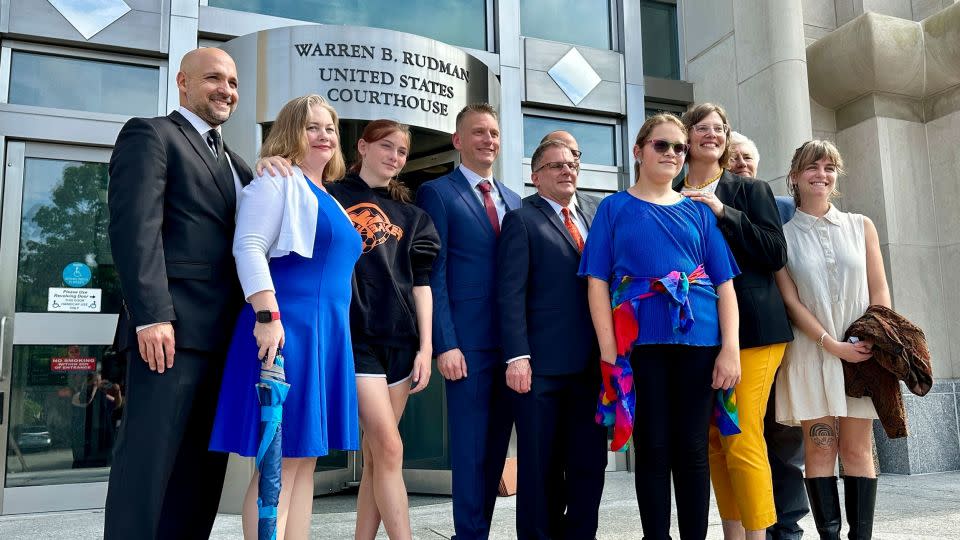AP Photo/Henny Ray Abrams
Torsten Sløk has said the risk of stagflation still hangs over the US economy.
The Apollo chief economist pointed to lower growth and higher inflation expectations due to tariffs.
The top economist had several other big calls in his midyear outlook.
The US has flirted with the dreaded S-word for much of this year, and it's not out of the woods yet.
That's according to Torsten Sløk, the chief economist at Apollo Global Management, who thinks the US is at a critical inflection point for stagflation, a dire scenario in which economic growth slows while inflation remains high.
That problem is often regarded as even harder for policymakers to solve than a typical recession, as higher inflation can prevent the Federal Reserve from cutting interest rates to boost the economy.
The scenario has largely been triggered by President Donald Trump's tariffs, Sløk wrote in a white paper published on Monday.
"Tariff hikes are typically stagflationary shocks — they simultaneously increase the probability of an economic slowdown while putting upward pressure on prices," Sløk wrote, adding that consensus forecasts on Wall Street for economic growth had drifted lower this year, while inflation forecasts have edged higher.
Chart showing consensus forecasts for GDP and inflation
Wall Street is expecting a lower rate of economic growth and a higher rate of inflation compared with forecasts last year.Bloomberg, Apollo Chief Economist
"That is the definition of stagflation," he later added.
Here are four predictions Sløk is making for the US economy in the current environment:
1. GDP will more than halve from its peak last year
GDP growth will most likely slow to about 1.2% in 2025, Sløk estimated. That reflects economic growth being slashed by more than half compared with its peak in the third quarter of 2024, when the GDP expanded 3.1% year over year.
GDP declined by 0.3% in the first quarter of 2025, the Bureau of Economic Analysis estimates, the first time the US economy contracted since 2022.
2. Inflation will remain above average in 2025
Inflation will probably hover around 3% by the end of the year, Apollo forecasts.
The firm said it was a "significant increase" from its prior forecast, which pegged inflation at about 2.4% before Trump announced his sweeping tariffs in April.
3. Unemployment will rise through 2026
The jobless rate in the US will keep picking up through at least the next 18 months. Apollo estimates that unemployment could rise from 4.2% currently to 4.4% in 2025 and tick up to 5% or higher in 2026.
To be sure, Apollo's forecast for year-end unemployment is still historically low, but rising unemployment has historically been linked to periods when the economy experienced stagflation.
When the US saw stagflation in the '70s and '80s, the unemployment rate peaked at about 9% in 1975, before cooling and rising to another peak of 10.8% in the early '80s, according to the Bureau of Labor Statistics.
4. The economy could still face a recession as soon as this summer
Apollo pegged the chances of a recession over the next 12 months at 25%. Prior to Trump's tariffs, the firm wasn't anticipating a recession at all this year, Sløk said.
Sløk went on to note that there is still a risk the economy could enter a recession as soon as this summer, referring to his "voluntary trade reset recession" thesis he first floated as tariffs swung into effect earlier this year.
The idea involves the economy entering a recession this summer as tariffs cause shipments to US ports and trucking demand to slow, leading to empty shelves and lower sales for firms.
Timeline of Apollo's voluntary trade reset recession
Apollo sees a recession hitting the US as soon as this summer as the effects of President Donald Trump's tariffs work their way through the economy.Apollo Chief Economist
The scenario still remains a risk, Sløk said, adding that the effects of Trump's Liberation Day tariffs were "still working their way through the trade pipeline."
Sløk has consistently warned about stagflation and a recession in recent months, though most forecasters on Wall Street generally expect the economy to avoid a downturn this year, particularly as the US continues to make progress on trade negotiations.




